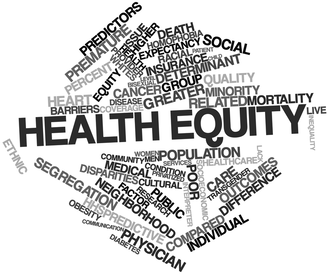
What is health equity?
There is increasing consensus that the concept of "health equity" means different things to different people and communities. This is largely because key social factors and other barriers (also defined as the "social determinants of health"—the conditions in places where people live, work and play, which affect a wide range of health risks and outcomes) that may prevent people from adopting a healthy lifestyle, staying healthy, or coping with disease and crisis often vary from one community to another.
For example, in some communities an important barrier to health equity may be the lack of access to affordable healthy food (e.g., in the case of food deserts). In other communities—such as in case of many towns in rural America—lack of adequate transportation systems may limit the ability of aging community members to reach healthcare services for routine checkups and other medical needs. As another example, social discrimination—such as in the case of racism, gender inequalities, xenophobia, unfair bias toward the LGBTQI+ community, or the stigma of poverty and related bias toward people from low socio-economic backgrounds— affects and intersects with many other social determinants of health, such as stress levels, access to employment and adequate housing, educational attainment, weak health and social systems, and access to quality and culturally-relevant health services, among others. "Ultimately, our goal should be to enable each community and sector to arrive at its own definitions of health equity as well as their own priorities in achieving it" by promoting systems-change (Health Equity Initiative 2016 Partnership Summit Report). In fact, addressing health equity issues often requires system thinking to promote change across different professional sectors, communities, and disciplines.
Nevertheless, words matter, especially because there are many definitions of health equity that may influence the way we think about advancing this important human right issue in our neighborhoods, communities, and cities. At Health Equity Initiative, we define health equity as following:
For example, in some communities an important barrier to health equity may be the lack of access to affordable healthy food (e.g., in the case of food deserts). In other communities—such as in case of many towns in rural America—lack of adequate transportation systems may limit the ability of aging community members to reach healthcare services for routine checkups and other medical needs. As another example, social discrimination—such as in the case of racism, gender inequalities, xenophobia, unfair bias toward the LGBTQI+ community, or the stigma of poverty and related bias toward people from low socio-economic backgrounds— affects and intersects with many other social determinants of health, such as stress levels, access to employment and adequate housing, educational attainment, weak health and social systems, and access to quality and culturally-relevant health services, among others. "Ultimately, our goal should be to enable each community and sector to arrive at its own definitions of health equity as well as their own priorities in achieving it" by promoting systems-change (Health Equity Initiative 2016 Partnership Summit Report). In fact, addressing health equity issues often requires system thinking to promote change across different professional sectors, communities, and disciplines.
Nevertheless, words matter, especially because there are many definitions of health equity that may influence the way we think about advancing this important human right issue in our neighborhoods, communities, and cities. At Health Equity Initiative, we define health equity as following:
Health Equity is providing every person with the same opportunity to stay healthy and/or effectively cope with disease and crisis - regardless of their socio-economic conditions, race, gender, ethnicity, age, social status, and other socially determined factors - by identifying and addressing community- and group-specific barriers that prevent people from leading healthy and productive lives.
-- Schiavo, R. and Health Equity Initiative, 2012-2020
-- Schiavo, R. and Health Equity Initiative, 2012-2020
This section includes relevant resources on defining "health equity" that are in sync with Health Equity Initiative's core values and commitment to community-driven and multi-sectoral solutions to address the many root causes of health inequities across different health and social systems. Please contact us if you know of a resource that you would recommend we add to our list. Our team will carefully evaluate all suggestions. Thank you.
Defining Health Equity Resources
- What is Health Equity? - Robert Wood Johnson Foundation (publisher)
- Health Equity - World Health Organization (publisher)
- Communities in Action: Pathways to Health Equity - Chapter 1 - The National Academies of Sciences, Engineering and Medicine (publisher)
- Health Equity - Institute for Healthcare Improvement (publisher)
- About Social Determinants of Health - World Health Organization (publisher)
Read also Health Equity Initiative's 2016 and 2018 summit reports for more information on health equity and strategies to address key social determinants of health and promote systems-change.

